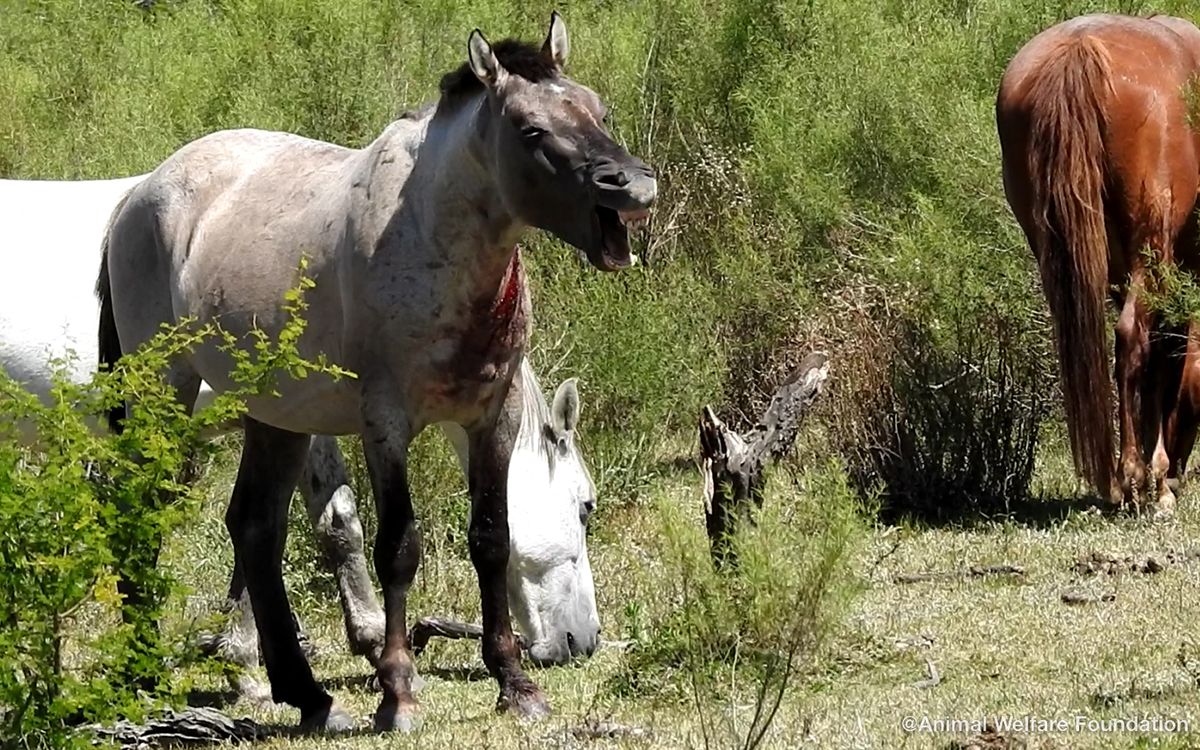

Blood farms: when animal testing serves the profitability of European farms
From porthole cows to rapidly grown chickens, it is hard to imagine a more horrific treatment than that reserved for pregnant mares whose blood is taken for the eCG hormone, used in French breeding farms to schedule ovulation and births. We wrote to Gircor three months ago. Welfarm have just revealed new footage.
For decades, public organisations have defended animal testing, particularly when it involves livestock animals. This is how the INRA [French National Institute for Agricultural Research], who has been looking to increase productivity of animals farmed for their meat or fluids since the 1960s, has more recently become involved in the foie gras industry, while the Ministry of Agriculture defended the use of porthole cows.
Zootechnics and animal testing
These animal testing practices reveal what we call zootechnics, which study and carry out tests on breeding conditions and animal exploitation. Every time, you can hear the words ‘animal welfare’ being echoed in the background.
But it is hard to imagine a more horrific treatment than that reserved for pregnant mares whose blood is taken to produce the eCG hormone, used in French breeding farms to schedule ovulation and births.
The horror of blood farms, from South America to Iceland
In South America, after four months of pregnancy and heavy blood tests, these mares are aborted manually, without any anaesthesia, to then be made pregnant again and subjected to the same treatment until they are so exhausted that they cannot be used.
Uncovering the footage circulated in France by Welfarm in 2017 and 2018, French companies ended up turning to Iceland, where pregnancies are carried to term and the foals sent to the abattoir. But the footage taken in 2021 shows that the situation in Iceland is no better than in South America.
A new investigation from the Animal Welfare Foundation | Tierschutzbund Zürich (AWF|TSB) in South America, carried out in 2021 and 2022, reveals that the situation is not getting better: mares are beaten, injured without being treated, malnourished, and neglected…
The eCG hormone in France
France is the only recipient in the European Union of the eCG powder produced by the Syntex company in Uruguay for astronomical amounts.
According to a French specialist questioned in 2017, the use of the eCG hormone is “almost systematic in breeding farms for goats and sheep [in France], in order to ensure milk production all year round. eCG is also used widely to schedule births and to increase the number of piglets per sow.
This is the “double disaster” reported: mares are farmed and mistreated elsewhere in the world to allow French breeding farms to better profit from their farming of sows, cows, sheep, and goats.
And eCG is the source of a third disaster: its use inevitably involves tests on animals. As long as they support a breeding system that is unnecessary, these tests, such as the production of eCG, are not vital and must therefore be considered illegal under rural legislation.
What the authorities concerned are saying
In 2017, the Ordre national des vétérinaires [National Association of Veterinarians] hid behind ‘animal welfare’ and the impossibility of knowing precisely where the eCG used in France comes from to avoid having to come down unfavourably on its use.
Three months ago, we sent a letter to Gircor, a French animal testing lobby, in order to see if they would go so far as to justify tests and practices that cause suffering to serve a breeding system that is not necessary. We have not received a reply…
What can you do?
If these practices outrage you as they do us, sign the petition requesting a pure and simple ban on the production and importation of the eCG hormone within the European Union.
Translated from the French by Joely Justice